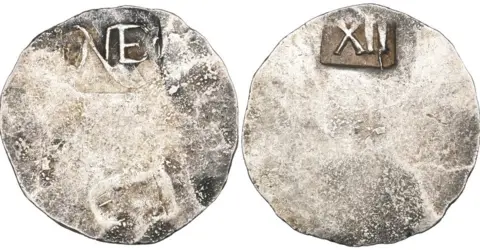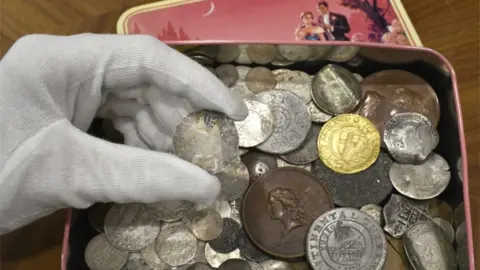Rare New England shilling found in Bywell Hall sweet tin
 Morton & Eden
Morton & EdenA rare example of one of the US's first coins has been found hidden in a collection kept inside a sweet tin.
The mid-17th Century New England shilling was found by Wentworth Beaumont at his family's home of Bywell Hall in Northumberland.
The coin was struck in 1652 for use as currency by early settlers in the Massachusetts Bay Colony.
It is hoped the coin could sell for £200,000 when it goes for auction in London next month.
Mr Beaumont, an art adviser, said the old confectionery tin which contained the coin and a number of others had been found in the hall's study,
He said: "I'd never seen it before and when I opened it I thought it was just a rather bizarre collection of random old coinage.
"However, as I don't know anything about coins, I felt it was worth checking out."
 Morton and Eden
Morton and EdenCoin specialist James Morton, who inspected the discovery for auctioneers Morton and Eden, said: "I could hardly believe my eyes when I realised that it was an excellent example of a New England shilling."
He said the coin is the "star of the collection", which also includes a Massachusetts "Pine Tree" shilling, two examples of "Continental Currency" pewter dollars dated 1776, a "Libertas Americana" bronze medal and several British hammered gold coins.
Mr Beaumont is descended from William Wentworth, who visited New England in 1636, and several members of the family went on to hold prominent positions in colonial America.
He said: "I can only assume that the shilling was brought back from America years ago by one of my forebears."

Follow BBC North East & Cumbria on Twitter, Facebook and Instagram. Send your story ideas to [email protected].
